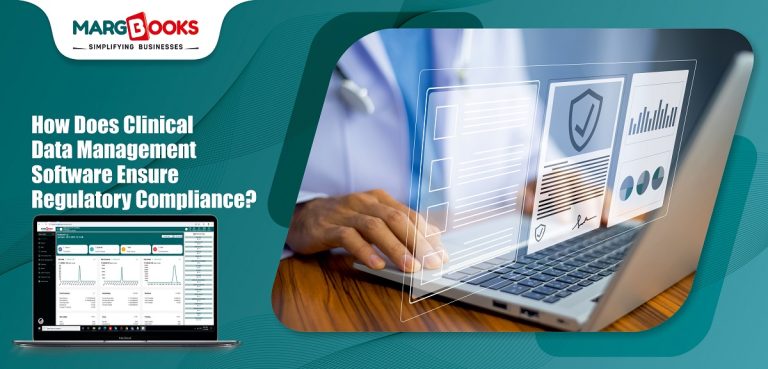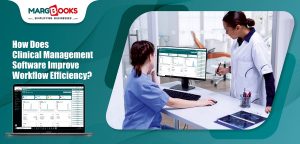In the world of clinical research and trials, ensuring regulatory compliance is not just a matter of following protocols; it is about maintaining the integrity and credibility of the entire clinical process. Clinical Data Management Software (CDMS) plays a critical role in this regard. As clinical trials generate vast amounts of data, managing this data efficiently and per regulatory standards becomes paramount.
This blog explores how clinical data management software helps ensure compliance while also highlighting its intersection with pharma billing software and pharma distribution software.
What Is Clinical Data Management Software (CDMS)?
Clinical Data Management Software (CDMS) is a sophisticated tool designed to capture, store, and manage data collected during clinical trials. It helps ensure that the data is accurate, consistent, and compliant with regulatory standards.
The primary objective of CDMS is to streamline the data collection process, enabling seamless management, analysis, and reporting while maintaining adherence to guidelines set by regulatory authorities like the FDA, EMA, and other local health authorities.
Key Regulatory Guidelines in Clinical Data Management
Before diving into the functionalities of CDMS, it’s important to understand the key regulatory frameworks that govern clinical trials:
- Good Clinical Practice (GCP): GCP guidelines ensure that clinical trials are conducted ethically and that the data generated is accurate and reliable.
- 21 CFR Part 11 (FDA): This is a crucial regulation that defines the criteria under which electronic records and electronic signatures are considered trustworthy and equivalent to paper records.
- ICH E6 Guidelines: These international guidelines focus on the design, conduct, performance, and monitoring of clinical trials. They emphasize the need for quality and integrity in the data collected.
These regulations are designed to protect patients and ensure that clinical trials are conducted with scientific and ethical rigor. Clinical data management software ensures that all collected data complies with these standards.
How Clinical Data Management Software Ensures Regulatory Compliance
1. Data Integrity and Accuracy
The foundation of regulatory compliance is the integrity of the data. Clinical data management software ensures the accuracy of data collected during clinical trials by using automated validation checks, data cleaning processes, and audit trails. These features help to:
- Detect discrepancies or inconsistencies in data in real time
- Ensure that only verified, validated data is included in the final report
- Minimize human errors during data entry and analysis
In addition, CDMS ensures that any changes to the data are logged with detailed timestamps and user identification. This is a critical requirement for meeting the regulatory expectations set by authorities such as the FDA.
2. Adherence to 21 CFR Part 11
Clinical data management software ensures that electronic records and signatures comply with 21 CFR Part 11. This regulation requires that electronic data must be secure, accurate, and readily available for inspection. The software provides:
- Audit Trails: A complete, unalterable log of every data modification, including the date, time, and user responsible for the changes.
- Electronic Signatures: A secure and authenticated way for clinical trial participants to sign documents electronically, which is legally equivalent to a traditional handwritten signature.
- Data Encryption: Robust encryption protocols ensure that all electronic data is secure and accessible only to authorized users, maintaining confidentiality and compliance with data protection regulations.
3. Efficient Data Collection and Storage
Clinical data management software automates many aspects of data collection, storage, and analysis, ensuring that the data is organized and compliant with regulatory standards. The software provides:
- Real-time Data Capture: Direct data entry into the system from sources such as clinical trial sites, eliminating the need for manual data transcription and reducing the risk of errors.
- Centralized Data Storage: All data from clinical trials is stored in a centralized database that is easy to access, update, and retrieve, ensuring data consistency and preventing discrepancies.
- Data Backup and Disaster Recovery: Regular backups of data ensure that no information is lost, and disaster recovery plans are in place to ensure data continuity even in the event of a system failure.
4. Standard Operating Procedures (SOPs)
CDMS ensures that clinical trial procedures follow the established SOPs, which is essential for compliance with regulatory guidelines. The software often integrates with other systems, such as pharma billing software and pharma distribution software, to ensure that all procedures are completed. By automating these procedures, CDMS minimizes the risk of non-compliance due to manual errors or deviations.
The Role of Pharma Billing Software and Pharma Distribution Software in Compliance
While clinical data management software is primarily focused on data integrity and regulatory compliance, it often integrates with other systems to ensure overall compliance across the pharmaceutical industry.
Pharma Billing Software
Pharma billing software helps ensure regulatory compliance by automating billing processes and ensuring accurate invoicing. Compliance is maintained by ensuring that all financial transactions associated with clinical trials are accurately documented and auditable.
Features such as invoice tracking, reporting, and integration with CDMS help streamline the billing process and prevent discrepancies, making it easier to comply with financial regulations.
Pharma Distribution Software
Pharma distribution software ensures that the drugs and medical devices used in clinical trials are distributed in compliance with regulatory standards. By managing inventory, tracking shipments, and maintaining detailed records of each product’s distribution.
This software ensures that the right products are delivered to the correct locations at the right time. Integration with CDMS ensures that all data related to drug distribution is accurate, traceable, and compliant with regulations.
Why Choose Margbooks?
Margbooks offers comprehensive solutions that help businesses, especially in the pharmaceutical sector, streamline their operations. Whether it’s clinical data management, pharma billing, or pharma distribution, Margbooks ensures that your business stays compliant with all relevant regulatory standards.
The software integrates seamlessly with various modules to ensure data integrity, improve workflow efficiency, and minimize the risk of errors.
Conclusion
Clinical data management software plays a crucial role in ensuring that clinical trials comply with the stringent regulatory requirements set by governing authorities. From maintaining data integrity to ensuring adherence to 21 CFR Part 11 and GCP guidelines, CDMS helps pharmaceutical companies and research organizations stay compliant throughout the trial process.
When integrated with pharma billing software and pharma distribution software, CDMS becomes part of a broader system that ensures complete compliance across every stage of the clinical trial and product distribution process.
For companies looking to streamline their clinical data management while ensuring regulatory compliance, leveraging platforms like Margbooks can be a game-changer in achieving both efficiency and compliance.




